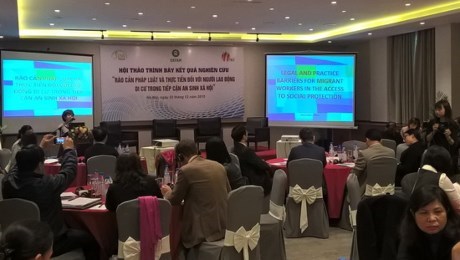Migrant workers need equitable access to social protection
A workshop was held in Ho Chi Minh City on December 23 on migrant workers’ access to social welfare services
 At the workshop (Source: baomoi.com)
At the workshop (Source: baomoi.com)The workshop heard the outcomes of a study on “Legal and Practice Barriers for Migrant Workers in their Access to Social Protection”, which was conducted by the Oxfam Vietnam and the Southern Institute of Social Sciences in conjunction with some non-governmental organisations in the Vietnam Action Network for the Rights of Migrant Workers (M.net) in Hanoi, Bac Ninh, HCM City and Dong Nai from the end of 2014.
According to Nguyen Thu Huong, a representative from the Oxfarm organisation, Vietnam has seen remarkable progress in social protection for migrant workers by expanding the coverage of social welfare network as suggested by the International Labour Organisation.
Between 2011 and 2015, the country has promulgated, adjusted, and supplemented laws and legal documents in the field along the direction of including migrant workers in general and migrant workers in the informal sector in particular among beneficiaries of social security policies.
However, in reality, it is still difficult for migrant workers – who are considered vulnerable groups in urban areas, to gain access to social welfare services, Huong said.
She quoted the study’s outcomes that showed 99 percent of migrant workers in the informal sector are not covered by any kind of social insurance, while more than 21 percent of children aged between 6 and 14 years living with their migrant parents in the city do not attend school.
Meanwhile, 77 percent of respondents said they do not join any community activities in the place where they live and most of them have to live in poor-quality rented rooms and pay twice or three times for the price of electricity and water compared to the locals.
Le Thanh Sang, Director of the Southern Institute of Social Sciences, said surveys in sectors having a large number of migrant workers such as garment, electronics, construction and vendors showed the rate of unemployment among migrants was five times the overall rate.
He said up to 52 percent of migrants in the informal sector have unstable employment and their incomes cannot meet essential living costs. At the same time, migrant workers have to pay more for accommodation, electricity and water services compared to locals.
The study noted problems connected to the allocation of State budget on the basis of the population of registered residents, as are many regulations on social welfare access, which prioritises “registered residents” over migrants.
Given the fact, experts suggested reviewing and removing regulations which hinders the access of migrant workers to social protection.
The State should expand the voluntary social insurance for workers in the informal sector and revise policies such as the minimum wage and voluntary insurance support to enable migrant workers to use social welfare services.
More communication campaigns are also needed to help labourers understand better about their legitimate rights and interests.-VNA












